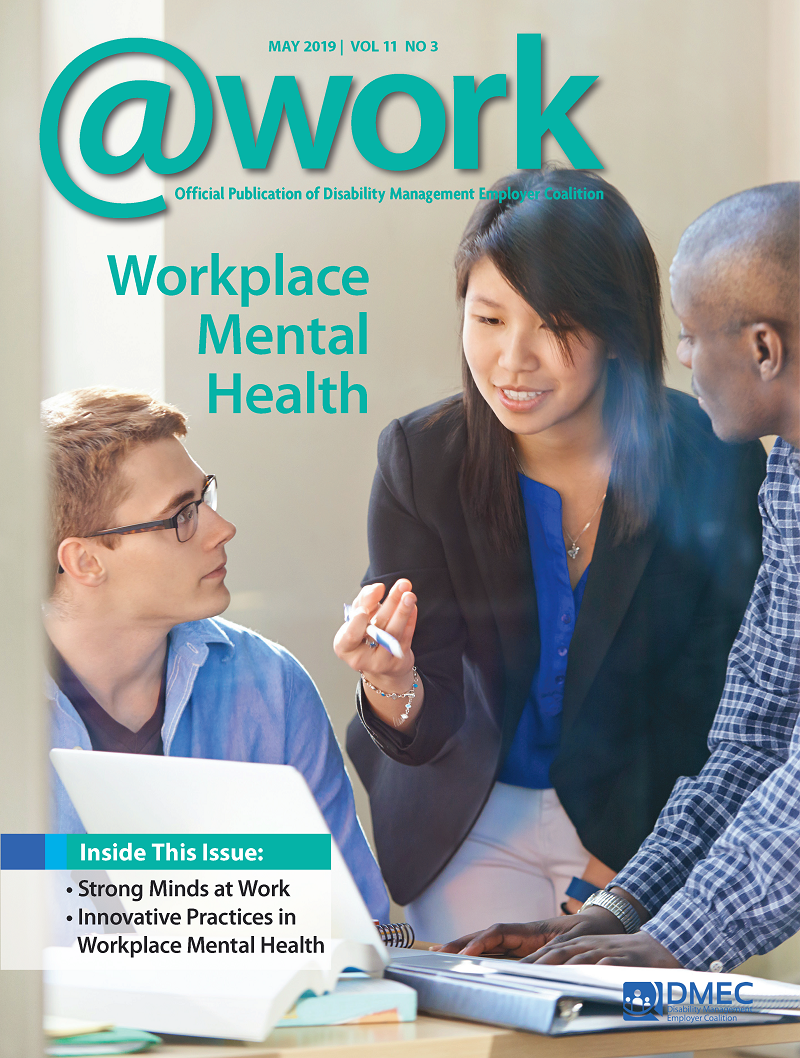
May 2019
Workplace Mental Health
44.7 million U.S. adults are living with a mental illness. Mental illness contributes significantly to absenteeism and decreased productivity in the workplace, and employers can't afford to ignore it. This issue of @Work will help you understand the impact of workplace mental illness and provide tips and solutions to assist you in managing your stay-at-work, return-to-work, and mental health programs.
Features
Strong Minds at Work
Mental health disorders, including substance misuse disorders, are the leading cause of disability worldwide, and mental illness may be the single most significant drain on productivity among U.S. workers. Strong Minds at Work, a mental health report, highlights current strengths in employer strategies for employee mental health and opportunities needing attention. Read more.

Innovative Practices: Workplace Mental Health
Mental health conditions can damage the corporate bottom line by impacting performance, productivity, retention. and disability rates. These conditions also affect every level of an organization from the factory floor to the C-Suite. Because of this, employers are focusing greater attention and resources on the mental health and well-being of employees. Read more.

Spotlight Articles
Program Showcase: Workplace Violence Intervention
In recent years, “active shooter” and “mass shooter” situations have garnered an exponential increase in media coverage and societal anxiety. Far too often interventions focus on what to do as an event unfolds and fail to adequately address interventions before an incident occurs. The best way to get out of a violent situation is to prevent it. Read more.

Compliance Showcase: Medical Information Privacy
Recent case law confirms that knowing employee health information presents significant litigation risks under the FMLA, the ADA, and comparable state laws. This is especially true for medical information related to mental illness. Read more.

SAW/RTW Showcase: Impact of Treatment Quality
Depression is the greatest contributor to worldwide disability. With a growing number of individuals being diagnosed with major depressive disorder, we became interested in preventing functional impairments following a depression diagnosis by investigating if the quality of depression treatment predicts a future work disability. Read more.

Columns
Absence Matters: Mental Health
Some employers are finding new urgency to provide mental health assistance and resources as they promote cultures of health and well-being. Here are three best practices for employers that are looking to address mental well-being and behavioral health needs in their workplace. Read more.

Integrated Absence Management: Cost Control vs. Productivity
Direct costs of healthcare for U.S. workers has increased more than 65% over the last decade, virtually erasing wage gains over the same period. Fortunately, several strategies can contain costs and maintain health. Read more.

Employer Solutions: Early Mental Health Resources
While some conditions mandate an immediate absence from work (e.g., strokes or cardiac events), others build over time. Mental health conditions fall in the second category, and their development can often be disrupted by how employers and leave or health administrators handle mental health condition precursors. Read more.

FMLA Second and Third Opinions: Medical Resources
For any number of reasons, an employer may have a “reasonable basis to doubt the validity” of an FMLA medical certification. Having convenient access to on-site or near-site medical personnel is an incredible plus to help employers work through this process. Read more.

The Disabled Workforce: Stressed-Out Workers
“I’m seriously stressed over my workload, and I have not been able to eat or sleep in weeks.” “My doctor told me that I can’t have stress at work, and this is absolutely stressful to me.” Are these statements verbal triggers that we need to enter into the Americans with Disabilities Act interactive process? The simple answer is “Yes.” Read more.

Absence Minded: SAW & Mental Health
Some of the most difficult absence types for employers, carriers, and third-party administrators (TPAs) to identify and address are related to an employee’s mental health. Everyone’s goal is to help the employee either stay at work or return to work, particularly with shorter absences. Read more.

Technology and Absence Management: Mental Health
While mental health is a complex issue, taking the first step to understand the available solutions is crucial. There are some key technology solutions available in the workplace mental health arena, ranging from smartphone apps to virtual reality, that can help. Read more.

Disability in the Workplace: Mental Health
Mental health accommodations can be challenging for employers to address and resolve. Did the employee request an accommodation? Is there appropriate medical support for an accommodation request? Is an accommodation legally required? Read more.

Mental Health At Work: Performance and Mental Illness
When an employee is facing discipline for performance or behavioral issues, a disclosure of an underlying mental health condition requires special attention. While employers are not required to rescind discipline upon learning of a potential psychiatric disability, the new information does require the addition of a second process going forward. Read more.

Aligning Workers' Compensation: Mental Health Return to Work
Corporate mental health benefits and related services can be excellent resources to help employees return to work after being injured on the job — if human resources knows how to interface with your workers’ compensation claims organization. Read more.

Departments
The CEO’s Desk: Confronting Bias and Bringing Change
Why is it that when an employee calls out for a mental health condition, our first response is to question it? When an employee has cancer or a broken leg, we instantly show empathy and compassion. Mental illness is real and treatable, and viewing this medical condition as anything other than legitimate, continues to promote stigma. Read more.

DMEC News: May 2019
This month's DMEC News features a variety of mental health tools including the new DOL and EARN Mental Health Toolkit and DMEC's latest behavioral health white paper and mental health resource page. Read more.

Compliance Memos: May 2019
The May 2019 compliance memos cover three important cases for employers including an ADA supervisor training liability case, a lactation rights and retaliation case, and an ADA "substantially limited" case. Read more.





